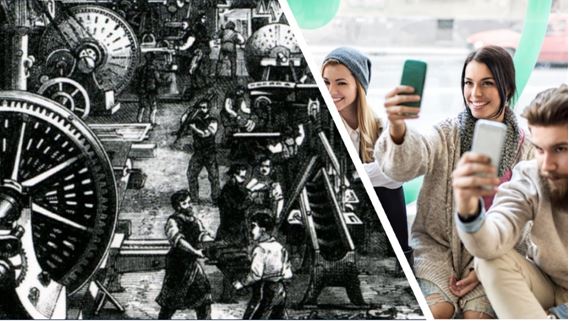As a starry eyed twenty five year old, I had the pleasure of working in the world’s first modern industrialized factory, the Soho Foundry in the West Midlands of England. It was created in 1795 by James Watt (after whom the unit of power, the watt was named) to build his revolutionary steam engines. When it opened its famous gates, the Soho Foundry was a beacon of sophistication. Its planning, production processes and its enlightened management techniques were ground breaking at the time and the workers of Britain’s industrial revolution flocked to work there.
Unfortunately, when I walked through those world-famous factory gates nearly two hundred years later, that illustrious management culture was a thing of the past. Hard core management was in vogue and the Soho Foundry was in the iron grip of one of GEC’s most notorious hatchet men. His party piece was terrorising his young managers in a manner that would have made a South American dictator blush. Paradoxically my career there prospered, and I soon found myself an executive manager in charge of sixty staff. The reason for my stellar elevation soon became evident. Most of the senior executives had been bullied out of their jobs and I happened to be the last man standing like the ice skater Stephen Bradbury. Two months later, I joined the mass exodus of talent when I realised that turning up for work each day was like being an out of favour general in Hitler’s bunker during the final weeks of the war.
My experience at the Soho Foundry taught me two vital lessons. Firstly, that having survived the ordeal, no other manager, no matter how bad could possibly match the brutalising experience I had endured, and secondly that I would forever treat young people in my procurement teams with kindness and compassion.
With the influx of the Millennial generation into the workforce and myself now a senior manager, it is time to put my resolution to the test. But firstly, I had to understand the psyche of this complex generation.
Millennials are often characterised as the ‘me’ generation who will change jobs at the slightest provocation. They are highly motivated by a sense of meaning and social justice and are extremely comfortable with technology. They want an extortionate salary and have ambition beyond their raw experience. (We’ve all been there!) They want a flexible workplace that gives them a satisfactory work-life balance and an inclusive style of management that will nurture them through their formative years. They see their work colleagues as an extension of their families and want constant reassurance and guidance from their boss. They want to enjoy their work and have fun at the workplace. In fact, they are just like I was when I walked through James Watts’ factory gates thirty years ago!
It has become obvious that today’s tyrannical bosses must change their workstyles if they are to retain their young staff. Here’s a tyrant’s guide to managing millennials in the 2020s:
1. Dominance and intimidation are so 1980’s
Most millennials change jobs because of bad bosses. Those characteristics of dominance and intimidation that were so admired last century must now be left outside the factory gates. Engagement surveys, harassment cases and common decency have put paid to that. Instead managers that have a calm and reassuring ‘presence’ have replaced the domineering bosses.
2. Arrogance is now seen as insecurity.
The 2020’s preference is for bosses who are humble but self-confident and who deflect praise and credit to their teams. Beneath that air of humility is a secure boss who knows his stuff and can guide the team through any crisis.
3. The close minded ‘know it all’ boss cannot deliver successful outcomes in the 2020s
The pace of technological and process change is so fast that no one person, no matter how experienced can possibly know it all. The 2020’s boss must rely on the collective knowledge and hard work of the entire team to get the job done. Once this knowledge has been harnessed, the skillful boss can then lead her team to success.
4. Finding flaws and constantly criticising your staff is the sign of a weak manager
Millennials expect their managers to have high expectations of the team, but in the 2020s, mistakes are viewed as a learning experience. A strong, confident boss will forge a close and collaborative working environment where the younger staff can learn in a protected environment while contributing to the success of the team. Mistakes are inevitable on any project and the best manager will take responsibility for the mistakes of their junior members.
5. Bad bosses create pressure, but the best bosses thrive under pressure.
Enough said.
6. It’s not about ‘Me the manager’, it’s about the team
Millennials tend not to be hierarchical by nature and will not respond well to the demands of an egotistical manager. They will thrive when given structured mentoring and coaching. The 2020s manager will cultivate an environment of continuous learning and set challenging but realistic targets. The successful manager will celebrate their team’s successes and create team bonding opportunities to create a tight knit team.
I have always believed that a happy team is a productive team and as your reputation as a manager grows, you will find it easier to recruit the smartest and accomplished millennials into your team.
You may not be a Jeff Bezos or a Mark Zuckerberg and may not work for Google or Australia’s Atlassian, but you can create a personal brand as an inspired and contemporary manager and one that the great eighteenth century industrialist James Watt would have been proud of.


